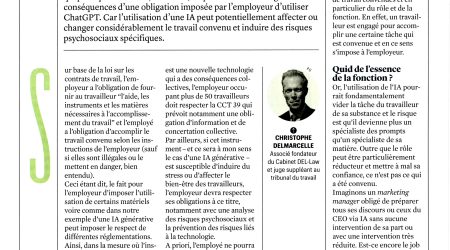Which right to a leave to find another job? (Trends 26-5-2022)
Posted the 25 June 2022Does an employee have the right to take leave during their notice period to find a new job if they resign? Can the employer demand evidence? Can the worker postpone unclaimed days?
The employment contract law of July 3, 1978, provides for the employee's right to take leave during the notice period, with retention of pay, for both employees and workers to seek employment (article 41).
This right can be exercised during the last 26 weeks of the notice period once or twice a week, up to one day per week. For the earlier period, the leave for job search is limited to half a day per week. Unless the worker is entitled to professional retraining in the general system, i.e., if they have more than 30 weeks' notice or in the special system for those over 45, in which case they are entitled to take leave once or twice a week for a maximum of one day throughout the notice period.
For part-timers, a pro-rata is applied.
The right is accrued weekly; therefore, unclaimed absences cannot be accumulated.
To benefit from this right, it is sufficient for the worker to be on notice, regardless of whether they have resigned or been dismissed, whether they are employed under an indefinite or fixed-term contract, or even if they have reached retirement age.
However, the absence is only authorized for job searching. A worker caught doing something else (shopping, tennis, etc.) may face a loss of wages or even dismissal for serious misconduct. However, it is up to the employer to prove the unjustified absence. This proof is challenging, especially as judges broadly define job searching (interviews, CV preparation, job search, etc.).
The same judges, however, almost unanimously consider that the right ceases when the worker has found a new job (with a signed contract or written offer, otherwise it is not certain). Yet, in 1986, Minister Hansenne suggested that this right could still exist in this case, as the worker might wish to find an even better job. This position was confirmed in 2011 following a parliamentary question from Madame Zemir.
Furthermore, case law admits that the worker has the right to privacy protection, and the employer cannot compel them to justify the reason for their absence.
The employer cannot limit this right by requiring prior authorization, justifying the reason for the absence (the worker has the right to discretion), or limiting when absences can be taken. In general, the worker is not obligated to inform the employer, and even if it is ideal to agree on the schedule of absences, the worker's interest takes precedence over the company's requirements. However, if the worker deliberately disrupts the company, they may be subject to a claim for damages for abuse of rights.
Related articles

Is an employer allowed to mandate the use of artificial intelligence tools by employees ? (Trends, 17-07-2025)

Caution if a former colleague opposed to your employer asks you to testify in their favor
